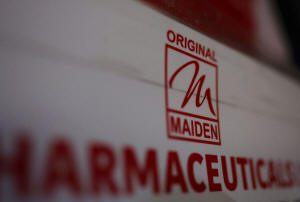India halts production at factory linked to Gambia deaths
 Send a link to a friend
Send a link to a friend
 [October 12, 2022]
By Tanvi Mehta [October 12, 2022]
By Tanvi Mehta
NEW DELHI (Reuters) -Indian authorities
have halted all production at a factory of Maiden Pharmaceuticals, a
state minister said on Wednesday, after a WHO report that the medicine
may be linked to the deaths of dozens of children in Gambia.
The health minister in Haryana state, Anil Vij, said that authorities
inspected a Maiden factory near the town of Sonepat in the state and
found 12 violations of good practices.
"Keeping this in view, the entire production of the company has been
banned and notice has also been issued," Vij said.
The WHO issued a medical product alert last week asking regulators to
remove Maiden Pharma goods from the market.
The WHO said that laboratory analysis of four Maiden products -
Promethazine Oral Solution, Kofexmalin Baby Cough Syrup, Makoff Baby
Cough Syrup and Magrip N Cold Syrup - had "unacceptable" amounts of
diethylene glycol and ethylene glycol, which can be toxic and lead to
acute kidney injury.
Gambian police, in a preliminary investigation report on Tuesday, said
that the deaths of 69 children from acute kidney injury was linked to
the cough syrups made in India and imported via a U.S.-based company.

It is one of the worst such incidents involving drugs from India, often
dubbed a "pharmacy of the world".
Authorities are waiting for test results on samples of three Maiden
Pharma drugs which have been sent to the Central Drug Laboratory in the
eastern city of Kolkata, Vij added.
News website Moneycontrol earlier quoted the Haryana drugs controller as
saying in a report that Maiden did not perform quality testing of
propylene glycol, diethylene glycol and ethylene glycol, while certain
batches of propylene glycol did not have the manufacturing and expiry
dates.
[to top of second column]
|

Logo of the Maiden Pharmaceuticals Ltd.
company is seen on a board outside their office in New Delhi, India,
October 6, 2022. REUTERS/Anushree Fadnavis
 Diethylene glycol and ethylene
glycol are used in antifreeze and brake fluids and other industrial
applications but also as a cheaper alternative in some
pharmaceutical products to glycerine, a solvent or thickening agent
in many cough syrups.
Maiden executive Naresh Kumar Goyal declined to comment. He told
Reuters last week that the company was trying to find out from its
buyer what had happened in Gambia.
Maiden says on its website it has an annual production capacity of
2.2 million syrup bottles, 600 million capsules, 18 million
injections, 300,000 ointment tubes and 1.2 billion tablets at three
factories.
It said it sells its products domestically and exports to countries
in Asia, Africa and Latin America.
The cough syrups had been approved for export only to Gambia, India
says, although the WHO says they may have gone elsewhere through
informal markets.
India's health ministry said last week that samples of all four
Maiden products that had been exported to Gambia had been sent for
testing to a federal laboratory and the results would "guide the
further course of action as well as bring clarity on the inputs
received/to be received from WHO."
The WHO did not respond to requests for comment.
(Reporting by Tanvi Mehta and Krishna Das; Editing by Christopher
Cushing, Raju Gopalakrishnan, Kirsten Donovan)
[© 2022 Thomson Reuters. All rights
reserved.] This material may not be published,
broadcast, rewritten or redistributed.
Thompson Reuters is solely responsible for this content. |